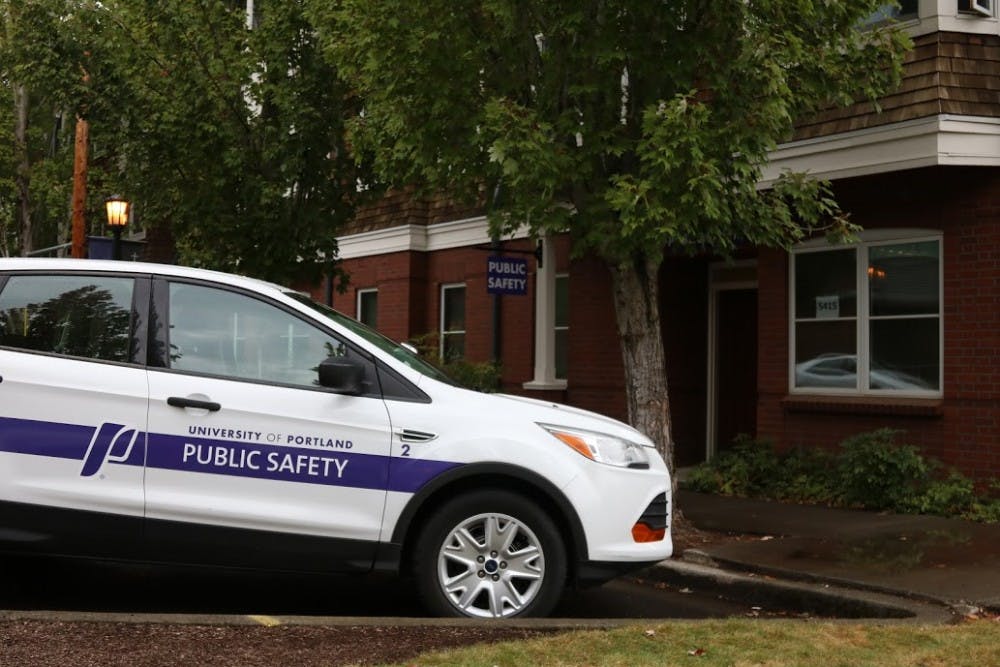University of Portland’s recently released Department of Public Safety Fire and Crime Report shows 2015 crime levels to be about the same as 2013 and 2014 levels, with no major changes despite the growing campus conversation regarding sexual assault and last year’s legalization of marijuana in Oregon.
The report states there were three sexual assaults in 2015, the same number reported in 2013 and 2014. Drug and alcohol violation statistics also remain fairly consistent with previous years.
This report is published every year in accordance with federal regulations, which require all universities to publish statistics on reported crimes that occur on university property. It includes crimes that occur on and immediately adjacent to campus, as well as in university-owned houses and university-owned buildings off-campus, such as the Salzburg campus.
Crimes that take place in areas not belonging to UP are not included in the report, even if they pertain to UP students. The report does not cover all types of crimes, such as minor thefts.
This year’s report lists all reported crimes in 2013, 2014 and 2015, including crimes of sexual assault, burglary, liquor law violations and drug law violations, among others.
It states that in 2015, there were three sexual assaults, five burglaries, 116 disciplinary referrals for liquor law violations, 13 disciplinary referrals for drug law violations, three instances of stalking, one instance of dating violence and one instance of hate crime vandalism reported on campus.
While the numbers remain mostly consistent with 2013 and 2014 reports, liquor law violations did drop from 161 violations in 2014.
Gerry Gregg, Director of Public Safety, said that the numbers do accurately represent violations that have been reported to the university.
“We talk to everyone while building this report,” Gregg said. “We talk to the Title IX Coordinator and student conduct to make sure we didn’t miss anything. We cross check with various entities to make sure we’re not missing anything.”
However, Gregg said that many crimes that occur at the university are not reported to Public Safety, especially sexual assaults. While the report states that only three sexual assaults occurred on campus last year, statistics show that many college-aged victims of sexual violence do not report to law enforcement. The report’s statistics also do not account for reported assaults that occurred in locations not belonging to the university, including many houses where students live off-campus.
“There is the general belief across the country that is that sexual assaults are underreported,” Gregg said. “If we hear about it, we report it. We don’t have the authority to not count one we hear about. The only way it isn’t counted is if the Portland Police or the Multnomah district attorney says it’s unfounded.”
Gregg says Public Safety and the University strive to create an environment where more sexual assaults will be reported and students will feel safe to come forward with interpersonal violence they might have experienced.
“We’ve worked very hard -- administration and the University and across many departments -- over the last several years to try to create an environment where people who are subjected to interpersonal violence know that it’s OK for them to report it, that the process is transparent, that people feel like the system and the process is such that they feel empowered,” Gregg said.
Gregg said Public Safety does receive training on how to handle cases of sexual assault. They are trained by the Association of Title IX Administrators on the practices of how to handle sexual assault cases at an annual two-day investigator training. They also meet with several different sources, including the Portland Police and the staff from the Health and Counseling Center, throughout the year. One of Public Safety’s two staff meetings focuses on “refresher training” for how to assist victims of sexual assault.
“Public Safety receives training on how to appropriately investigate, how to respond to the reported party, and how they interact with the accused … what our obligations are under Title IX, what options the reporting party has to pursue,” Gregg said. “You’re never fully trained to where you don’t need any more training. It’s a work in progress. It’s ongoing, and sometimes it’s refresher training.”
Gregg says victims’ safety and well-being are the priority when public safety receives a report of sexual assault.
“The first thing we want to do is make sure you’re OK,” Gregg said. “What can we do to assist you, make you feel safe, which kind of group support resources you need. And then we discuss reporting options. You can report to the Portland Police, you can report through Public Safety and have it formally processed through the student conduct office, you can report it to the Title IX coordinator, you can report it anonymously. The victim or the reporting party has that option. Their first question is, ‘How would you like to proceed?’”
Marijuana usage has been another hot topic on campus since it was legalized in Oregon last year. However, drug violation statistics on campus remain similar to past years. Gregg attributes the consistency to the University clearly stating that drugs are still not allowed on campus.
Gregg pointed out that though the numbers are consistent, he hopes that students will increasingly feel empowered to report the crimes and sexual assaults that occur.
“The numbers are fairly consistent (with last year), particularly in the area of reported sexual assaults,” Gregg said. “Do I want more reports? If there are more occurrences of interpersonal violence, then we, of course, want the reports. The numbers aren’t going to upset me if they go up because people feel now more empowered to report something that shouldn’t have happened. That’s an interdisciplinary effort across campus that will make that happen.”








